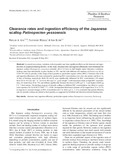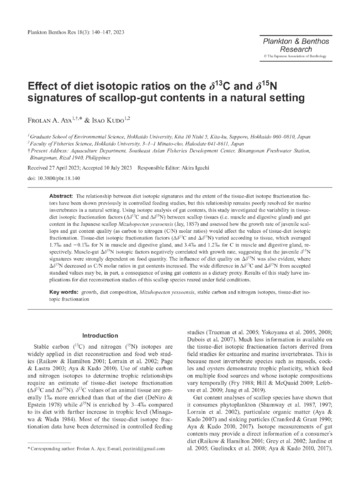Seasonal growth, organ indices and food consumption of the Japanese scallop Patinopecten yessoensis (Jay, 1857) in relation to food availability in Tokoro seabed, Okhotsk Sea, North Japan
| dc.contributor.author | Aya, Frolan | |
| dc.contributor.author | Kudo, Isao | |
| dc.coverage.spatial | Okhotsk, Sea of | en |
| dc.date.accessioned | 2022-06-01T02:37:51Z | |
| dc.date.available | 2022-06-01T02:37:51Z | |
| dc.date.issued | 2022-05-30 | |
| dc.identifier.citation | Aya, F. A., & Kudo, I. (2022). Seasonal growth, organ indices and food consumption of the Japanese scallop Patinopecten yessoensis (Jay, 1857) in relation to food availability in Tokoro seabed, Okhotsk Sea, North Japan. Plankton and Benthos Research, 17(2), 156–164. | en |
| dc.identifier.issn | 1880-8247 | |
| dc.identifier.uri | http://hdl.handle.net/10862/6326 | |
| dc.description.abstract | The coastal waters off Tokoro, Okhotsk Sea have been characterized by a substantial decrease in primary production from spring to summer season which will have repercussions on the maintenance of the Japanese scallop Patinopecten yessoensis (Jay, 1857) culture. This study examined the seasonal changes in scallop growth, condition and organ indices in relation to environmental conditions, and compared the sinking particulate organic carbon (POC) flux as an estimate of food availability to scallop food requirements. Monthly specimens were obtained in July 2005, and from May 2006 to December 2008 off Tokoro, Okhotsk Sea. Growth parameters derived from the modified von Bertalanffy growth function of 885 scallop individuals were the mean asymptotic shell height H∞=126.51 mm, Brody growth coefficient K=0.081 year−1, and t0=6.19 year. Condition (CI) and gonadosomatic indices (GSI) increased in April and May, decreased from June to September, but increased again from October until May. The adductor muscle index (AMI) increased from June to October, but declined from November until May when CI and GSI began to increase. Primary production (PP) and chlorophyll a biomass decreased from spring (25.75–29.74 µg C L−1 h−1 and 1.74–5.37 µg L−1) to autumn (0.90–10.83 µg C L−1 h−1 and 0.29–0.75 µg L−1) concurrent with decreasing CI and GSI, but no deleterious effect on AMI was evident during these periods. The sinking POC flux (25–68 mg C m−2 day−1) was low during summer when gonad activity was also low, but started to increase in autumn when gonad activity started to peak. Although a deficit in food availability (lower sinking POC fluxes than scallop food consumption) was observed during summer, the potential advection of organic matter from offshore to nearshore region may have provided additional source of food to bottom-cultured scallops, contributing in part to the increase in shell growth and somatic tissues. | en |
| dc.language.iso | en | en |
| dc.publisher | The Plankton Society of Japan (The Japanese Association of Benthology) | en |
| dc.relation.uri | https://www.jstage.jst.go.jp/article/pbr/17/2/17_B170213/_pdf/-char/en | en |
| dc.subject | scallops | en |
| dc.title | Seasonal growth, organ indices and food consumption of the Japanese scallop Patinopecten yessoensis (Jay, 1857) in relation to food availability in Tokoro seabed, Okhotsk Sea, North Japan | en |
| dc.type | Article | en |
| dc.identifier.doi | 10.3800/pbr.17.156 | |
| dc.citation.volume | 17 | |
| dc.citation.issue | 2 | |
| dc.citation.spage | 156 | |
| dc.citation.epage | 164 | |
| dc.citation.journalTitle | Plankton and Benthos Research | en |
| dc.subject.asfa | scallop culture | en |
| dc.subject.asfa | growth | en |
| dc.subject.asfa | food availability | en |
| dc.subject.asfa | seasonal variation | en |
| dc.subject.asfa | chlorophylls | en |
| dc.subject.asfa | isotopes | en |
| dc.subject.asfa | production | en |
| dc.subject.asfa | particulate organic carbon | en |
| dc.identifier.essn | 1882-627X | |
| dc.subject.scientificName | Patinopecten yessoensis | en |
| local.subject | Condition indices | en |
| local.subject | Food consumption | en |
| local.subject | Growth | en |
| local.subject | Japanese scallops | en |
| local.subject | Sinking particulate organic carbon flux | en |
このアイテムのファイル
| ファイル | サイズ | フォーマット | 閲覧 |
|---|---|---|---|
|
このアイテムに関連するファイルは存在しません。 |
|||
このアイテムは次のコレクションに所属しています
-
Journal Articles [1258]
These papers were contributed by Department staff to various national and international journals.




